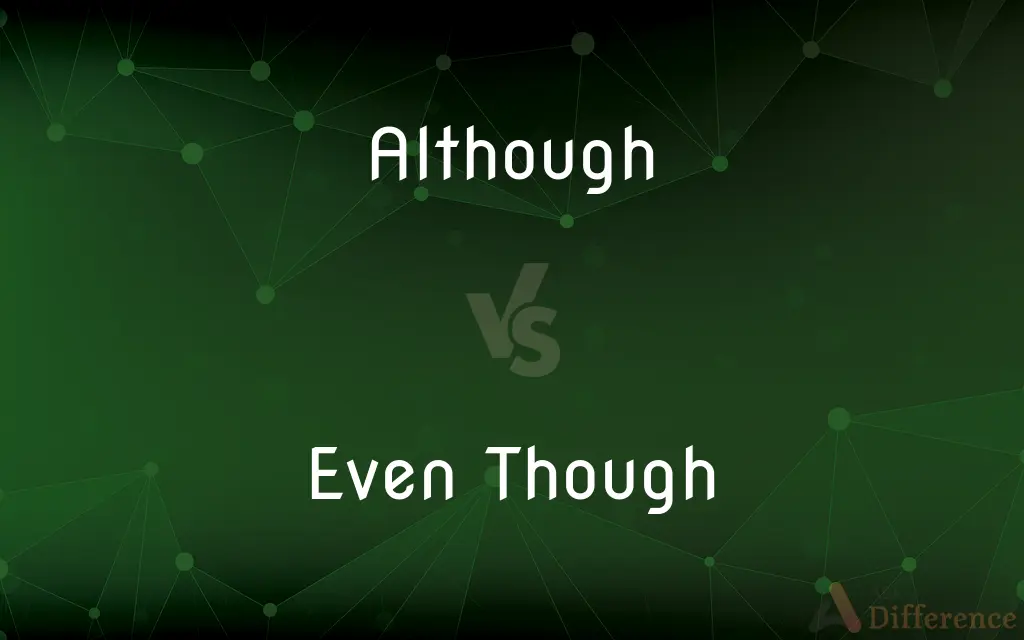Although vs. Even Though — What's the Difference?
By Tayyaba Rehman — Published on November 3, 2023
"Although" and "even though" are both conjunctions used to introduce contrasting ideas. "Even though" is a stronger emphasis of contrast than "although."

Difference Between Although and Even Though
Table of Contents
ADVERTISEMENT
Key Differences
"Although" serves as a conjunction to present a contrast or contradiction between two ideas in the same sentence. Its role is essential to show opposing concepts without overly emphasizing the contrast. In comparison, "even though" also functions as a conjunction, sharing a similar purpose but with a heightened sense of contrast, emphasizing the unexpected nature or surprise of the information being presented.
For sentences where the contrast is mild or ordinary, "although" is the fitting choice. For instance, "Although I like coffee, I drink tea in the mornings." Here, the preference for coffee is contrasted in a subtle manner with the daily practice of drinking tea. On the other hand, "even though" would be suitable for sentences where there's a sharper, more emphasized contrast. For example, "Even though it was raining heavily, he went for his morning run."
In terms of frequency, "although" can be considered more common in everyday language, providing a smooth transition between contrasting points. "Even though," given its emphatic nature, is used more sparingly to ensure the emphasis it provides isn’t diluted. For instance, you wouldn’t use "even though" to describe everyday, expected contrasts, but reserve it for situations where the contrast truly stands out.
The choice between "although" and "even though" boils down to the degree of contrast a writer or speaker wants to convey. If the aim is to subtly present contradictory points, "although" is the way to go. If the goal is to stress or highlight the disparity between two ideas, "even though" becomes the ideal choice.
Comparison Chart
Function
Conjunction
Conjunction
ADVERTISEMENT
Degree of Contrast
Mild contrast
Strong/emphasized contrast
Emphasis
Lesser
Greater
Common Usage
More frequent
Less frequent but more pointed
Example
Although it’s cold, I swim.
Even though it's freezing, I swim.
Compare with Definitions
Although
It introduces a dependent clause expressing an idea that contrasts with the main clause.
He went to the game, although he isn't a big sports fan.
Even Though
It is used to stress the disparity between two contrasting ideas.
He wakes up early, even though he's a night owl.
Although
"Although" signals a difference or unexpected element in the context.
Although the sun was shining, there was a chill in the air.
Even Though
"Even though" is a conjunction indicating a strong contrast.
Even though he had an umbrella, he got soaked in the rain.
Although
"Although" balances two opposing ideas in a single sentence.
She decided to go, although she wasn't sure it was the right choice.
Even Though
It emphasizes the surprising or unexpected nature of the contrast.
She smiled, even though she was feeling sad.
Although
"Although" is a conjunction used to indicate contrast within a statement.
Although she was tired, she completed her assignment.
Even Though
"Even though" introduces a stronger opposition than "although."
Even though they were rivals, they respected each other.
Although
It's employed to smoothly transition between contrasting points.
Although I enjoy hiking, I haven't done it recently.
Even Though
"Even though" is chosen when a heightened contrast is desired.
Even though she studied hard, she didn't pass the test.
Although
Regardless of the fact that; even though
Although the room is big, it won't hold all that furniture.
Although
But; however
He says he has a dog, although I've never seen it.
Although
Though, even though, in spite of or despite the fact that: introducing a clause that expresses a concession.
Although it was very muddy, the football game went on.
The patients, (al)though getting stronger, will not come off their medications.
Although
But, except.
It was difficult, although not as difficult as we had expected.
Although
Grant all this; be it that; supposing that; notwithstanding; though.
Although all shall be offended, yet will not I.
Although
Despite the fact that;
Even though she knew the answer, she did not respond
Common Curiosities
Is "even though" more emphatic than "although"?
Yes, "even though" offers a greater degree of emphasis compared to "although."
Are "although" and "even though" interchangeable?
While they can be used in similar contexts, the choice depends on the desired level of contrast.
Can I start a sentence with "although"?
Yes, you can begin a sentence with "although" to introduce a contrasting idea.
When should I use "although" in a sentence?
Use "although" to introduce a mild or ordinary contrast within a statement.
How do I decide between using "although" and "even though"?
Consider the degree of contrast you want to convey; for stronger emphasis, opt for "even though."
How does "even though" differ in meaning from "although"?
"Even though" provides a stronger emphasis on contrast than "although."
Does "although" always need to introduce a contrast?
Yes, "although" is inherently contrasting, juxtaposing two ideas.
Does "although" always indicate opposition?
Yes, "although" consistently introduces contrasting or opposing ideas.
Can "even though" and "although" be used in the middle of a sentence?
Absolutely, both can be used mid-sentence to introduce a contrasting idea.
Are "although" and "even though" formal language?
Both can be used in formal and informal contexts, with "even though" sounding slightly more informal.
In what contexts is "even though" most suitable?
"Even though" is apt for situations with a sharper or unexpected contrast.
How do I punctuate sentences using "although"?
Generally, you don't need to use a comma unless "although" begins the sentence.
Is it appropriate to use "even though" in academic writing?
Yes, "even though" can be utilized in academic writing for strong contrasts.
Is there a situation where "although" is not suitable, but "even though" is?
When emphasizing an unexpected or surprising contrast, "even though" is more apt.
Can "even though" begin a sentence?
Yes, "even though" can be positioned at the start of a sentence.
Share Your Discovery

Previous Comparison
Regards vs. Yours Sincerely
Next Comparison
Everything vs. Every ThingAuthor Spotlight
Written by
Tayyaba RehmanTayyaba Rehman is a distinguished writer, currently serving as a primary contributor to askdifference.com. As a researcher in semantics and etymology, Tayyaba's passion for the complexity of languages and their distinctions has found a perfect home on the platform. Tayyaba delves into the intricacies of language, distinguishing between commonly confused words and phrases, thereby providing clarity for readers worldwide.
















































